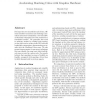Free Online Productivity Tools
i2Speak
i2Symbol
i2OCR
iTex2Img
iWeb2Print
iWeb2Shot
i2Type
iPdf2Split
iPdf2Merge
i2Bopomofo
i2Arabic
i2Style
i2Image
i2PDF
iLatex2Rtf
Sci2ools
129
click to vote
CASCON
2006
2006
Accelerating marching cubes with graphics hardware
For large data sets in medicine and science, efficient isosurface extraction and rendering is crucial for interactive visualization. Previous GPU acceleration techniques have been restricted to tetrahedral meshes. We generalize this work to arbitrary meshes by caching local topology on the video card to reduce both CPU load and bandwidth consumption, demonstrating our results with the Marching Cubes cases. We also present improvements to span space techniques that pre-classify the rangs over which individual cases are used in a given cube. Our results indicate that speedups in excess of tenfold are feasible, compared with speedups of less than twofold demonstrated in previous papers.
CASCON 2006 | CASCON 2007 | Efficient Isosurface Extraction | Large Data Sets | Tetrahedral Meshes |
Related Content
| Added | 30 Oct 2010 |
| Updated | 30 Oct 2010 |
| Type | Conference |
| Year | 2006 |
| Where | CASCON |
| Authors | Gunnar Johansson, Hamish Carr |
Comments (0)

